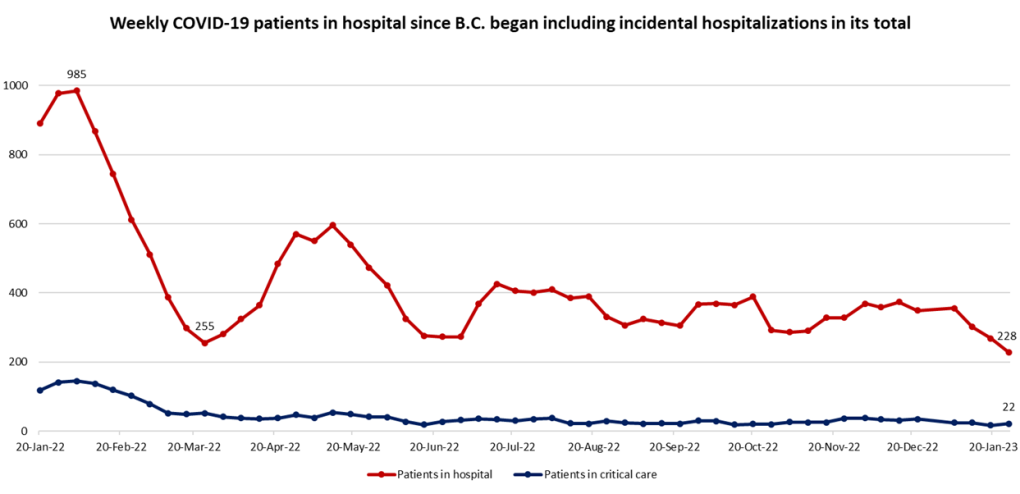Fewer COVID-19 patients in B.C. hospitals today than at any point in 2022
 A sign at the entrance to Surrey Memorial Hospital is seen on Saturday, Feb. 5, 2022. (CTV)
A sign at the entrance to Surrey Memorial Hospital is seen on Saturday, Feb. 5, 2022. (CTV)
The number of people hospitalized with COVID-19 in B.C. has reached its lowest level in more than a year.
The B.C. Centre for Disease Control reported 228 test-positive patients in hospitals across the province as of Thursday. The last time the hospital population was that low was before the BCCDC switched counting methods and began including "incidental" hospitalizations in its weekly total.
 The number of patients in B.C. hospitals with COVID-19 on Thursdays since the province started including incidental cases in its count is shown. (CTV)
The number of patients in B.C. hospitals with COVID-19 on Thursdays since the province started including incidental cases in its count is shown. (CTV)
That switch happened in January 2022. Until this week, the lowest number of patients in hospital on a Thursday since that change had been 255 on March 24, 2022.
"Incidental" COVID-19 hospitalizations are those in which a patient tests positive for the disease after being admitted to hospital for some other reason.
Before January 2022, B.C. reported only hospitalizations in which COVID-19 was believed to be the underlying cause. The last time that count was below 228 was the last day of 2021, when there were 220 patients in hospital under the old counting method.
Health officials have said between 40 and 50 per cent of the patients in hospital with COVID-19 each week are there because of the disease, while the rest are incidental hospitalizations.
OTHER DATA
Thursday's update from the BCCDC also included 408 new lab-confirmed cases of COVID-19 from the week of Jan. 15 to 21, a substantial decrease from the 560 reported the week before and the lowest total reported since the week of Oct. 30 through Nov. 5.
There were also 104 new hospital admissions – a different metric than the currently hospitalized population – during the week of Jan. 15 to 21, down from 142 initially reported during the preceding week.
Both the weekly case count and new hospital admissions are imperfect measures. The former does not include reinfections or at-home rapid antigen tests, while the latter is always revised higher in the following week's report.
Because of the limitations of the weekly case count, experts have estimated that B.C.'s official figures for COVID-19 infections are off by roughly 100-fold.
Still, both cases and new hospital admissions are trending downward, and wastewater surveillance – which was recently expanded to include communities in the Interior and on Vancouver Island – has been pointing in the same direction.
This week's wastewater data has not yet been released, but as of last week's update, every monitored treatment plant in the province was showing decreased concentrations of the coronavirus.
VACCINATION AND 'KRAKEN'
In an update last week, federal health officials said it's unclear whether the XBB.1.5 lineage of SARS-CoV-2 – also known as the "Kraken" variant – will become the dominant strain of COVID-19 in Canada, but it's proportion of the country's total infections has been rising.
Citing this risk, Chief Public Health Officer Dr. Theresa Tam and federal Health Minister Jean-Yves Duclos echoed advice from the National Advisory Committee on Immunization, which continues to urge all Canadians ages five and older to get a booster dose of a bivalent COVID-19 vaccine if they haven't already.
In B.C., 19,291 doses of vaccine were administered during the week that ended Jan. 21.
While 83 per cent of residents of all ages have received at least two doses of a COVID-19 vaccine, significantly fewer have had a booster dose. As of Jan. 22, 56 per cent had had at least three doses, with 32 per cent – mostly those in the older age groups more susceptible to serious illness – had had at least four.
CTVNews.ca Top Stories

Harvey Weinstein's 2020 rape conviction overturned by N.Y. appeals court
New York's highest court on Thursday overturned Harvey Weinstein's 2020 rape conviction, reversing a landmark ruling of the #MeToo era in determining the trial judge improperly allowed women to testify about allegations against the ex-movie mogul that weren't part of the case.
BREAKING Honda to get up to $5B in govt help for EV battery, assembly plants
Honda is set to build an electric vehicle battery plant next to its Alliston, Ont., assembly plant, which it is retooling to produce fully electric vehicles, all part of a $15-billion project that is expected to include up to $5 billion in public money.
MPP Sarah Jama asked to leave Ontario legislature for wearing keffiyeh
MPP Sarah Jama was asked to leave the Legislative Assembly of Ontario by House Speaker Ted Arnott on Thursday for wearing a keffiyeh, a garment that is banned at Queen’s Park.
CTE: Researchers believe widespread brain injury may contribute to veteran suicide rate
Researchers are working to better understand if some Canadian military veterans may be suffering from Chronic Traumatic Encephalopathy, also known as CTE -- a disorder previously found in the brains of professional football and hockey players after their death.
1 arrested in northern Alberta during public shelter order
Residents of John D'Or Prairie, a community on the Little Red River Cree Nation in northern Alberta, were told to take shelter Thursday morning during a police operation.
Secret $70M Lotto Max winners break their silence
During a special winner celebration near their hometown, Doug and Enid shared the story of how they discovered they were holding a Lotto Max ticket worth $70 million and how they kept this huge secret for so long.
Remains from a mother-daughter cold case were found nearly 24 years later, after a deathbed confession from the suspect
A West Virginia father is getting some sense of closure after authorities found the remains of his young daughter and her mother following a deathbed confession from the man believed to have fatally shot them nearly two decades ago.
New deep-water channel allows first ship to pass Key bridge wreckage in Baltimore
The first cargo ship passed through a newly opened deep-water channel in Baltimore on Thursday after being stuck in the harbor since the Francis Scott Key Bridge collapsed four weeks ago, halting most maritime traffic through the city's port.
First in Canada procedure performed at London, Ont. hospital
A London man has become the first person in Canada to receive a robotic assisted surgery on his spine. Dave Myeh suffered from debilitating, chronic back pain that led to sciatica in his right now and extreme pain in his lower back.
































